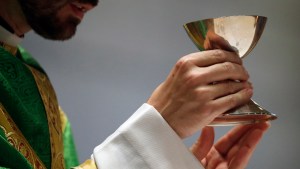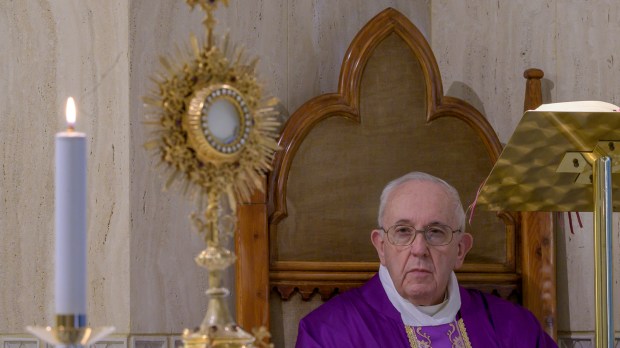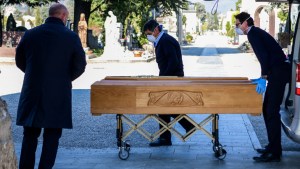I have gotten news in these days of some doctors, priests, and I don’t know if some nurses, who have been infected. They got the disease because they were serving the sick. Let us pray for them, for their families — and I give thanks to God for the example of heroism that they are giving us in caring for the sick.
The pope’s homily focused on the healing of the man at the pool called in Hebrew Bethesda, from John Chapter 5. He noted how the day’s readings bring us to reflect on water, as a symbol of salvation but also of destruction. The Gospel brings us to the water of a pool, where it was said that an angel moved the waters, and the first to get in would be healed.
There was a man who had been sick for 38 years. Thirty-eight years there, waiting to be healed. That makes us think, no? It’s a little much. … Because a man who wants to be healed arranges things so as to have someone who helps him, who moves him, someone who’s quick, even a little astute. … But this man, 38 years there, to the point that it’s not clear if he’s sick or dead.
Jesus knows this man’s situation, the pope continued, and seeing him there, he asks him: “Do you want to be well?”
The Holy Father noted that the man’s answer is interesting.
He doesn’t say yes; he complains. About his illness? No. The sick man responds: ‘Sir, I have no one to put me into the poolwhen the water is stirred up; while I am on my way, someone else gets down there before me.’ … The attitude of this man makes us think. Is he sick? Yes, perhaps he had some paralysis, but it seems he could walk a little. But he was sick in the heart, he was sick in the soul, he was sick with pessimism, he was sick with sadness, he was sick with laziness. That’s the illness of this man: ‘Yes, I want to live, but …’ And it gets stuck there. Instead of, ‘Yes! I want to be healed!’ no, he complains: ‘the others get there first. It’s always the others.’ The answer to Jesus’ offer of healing is a complaint about the others. And like that, 38 years of complaining about the others. And not doing anything to be healed.
The pope said that the key to the encounter is when Jesus sees him later, and tells him: “Look, you are well; do not sin any more, so that nothing worse may happen to you.”
His sin, said the pope, was of merely surviving and complaining about the life others have. “The sin of sadness is the seed of the devil, of this incapacity to make a decision about your own life, and instead, looking at other’s lives so as to complain. Not to criticize them, but to complain.”

Read more:
Have we been putting this off for 38 years?
Comparing this man with the man who was born blind from birth, who we heard about on Sunday, the Hoy Father said that the account of today “makes me think of so many of us, so many Christians who live in this state of laziness, incapable of doing anything more than complain about everything.”
And laziness is a poison, it’s a cloud that surrounds the soul and doesn’t allow it to live. And it’s also a drug, because if you taste it very often, you like it. And you end up being an addict of sadness, an addict of laziness. It’s like our air. And this is a sin that is very common among us: sadness, laziness …
The pope urged us to read again this fifth chapter of John, to see how we might fall into this. “Do you see the reactions of the others who are healed, who take up their mat and dance, sing, give thanks, and tell the whole world? …. Instead of going to Jesus and telling him thanks, this man reports [to the Jews]: ‘It was him.’ A gray life, but gray from this evil spirit that is laziness, sadness, melancholy.”
Pope Francis concluded with an invitation to consider the water that is a symbol of strength and life, that Jesus uses to regenerate us, in baptism. But also to consider if we fall into this laziness, in this “sin of neutral.”
The sin of neutral is this — neither black nor white, we don’t know what it is. And this is a sin that the devil can use to crush our spiritual life and also our life as persons. May the Lord help us to understand how ugly and bad this sin is.
The Holy Father concluded Mass with Benediction and leading a prayer of Spiritual Communion, for all the faithful unable to participate in Mass in these days of quarantine.

Read more:
This Spiritual Communion prayer is the easiest to memorize


